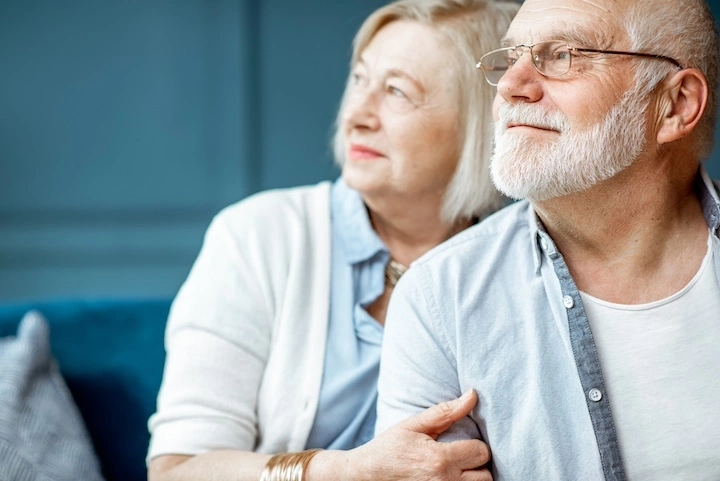
19 février 2024
In a world where attention is increasingly focused on natural, personalised wellness solutions, seniors find themselves at the crossroads between traditional medicine and promising alternative approaches.
This article, inspired by an interview with Dr. Nelly Le Grand for the French Seniors Actuels magazine, explores the usefulness of essential oils for seniors, shedding light on their benefits, necessary precautions, as well as practical advice for their use.
Essential oils as a vector of innovation for the Silver Economy
Landema, a European specialist in direct-from-producer online sales of essential oils based in France, is interested in this article in the impacts of its activity on the “Silver economy”. The Silver economy, also called the Senior economy, encompasses all products and services for the elderly in response to the aging population. It is not limited to a single sector, but concerns multiple areas such as food, leisure, transportation, health, sports and housing. Its objective is to encourage innovation to support the aging population and improve seniors’ quality of life.
In France, the Silver Economy was officially launched in 2013, and it has led to the creation of many jobs. It concerns not only the elderly, but also young retirees and still active seniors.
To guide us on this exploratory journey, we asked a holistic health specialist to share her knowledge with us. Nelly Le Grand holds a Doctorate in Pharmacy with a rich background in varied training and experiences, including ethnobotany, scientific aromatherapy and micronutrition. She has travelled to discover other cultures and specialised in the use of plants and essential oils, integrating a global approach to health in her practice.

Why are essential oils recommended for seniors?
The 2023 barometer of the French Institute of Seniors reveals that health is a major priority for seniors, who daily adopt preventive measures, particularly regarding diet and physical activity. This shows an increased awareness of the importance of maintaining a healthy lifestyle for this age group. Essential oils, which are powerful plant concentrates, are increasingly appreciated for their multiple virtues.
Their use continues to expand, reaching a diverse audience, including seniors. They can, for example, help relieve joint pain, improve sleep quality, reduce anxiety, and even strengthen the immune system. Studies have shown that some essential oils possess anti-inflammatory, analgesic, antiseptic or relaxing properties, which make them particularly useful to counter ailments frequently encountered with age.
“Essential oils prove to be tremendous natural tools to relieve sleep disorders, physical pain and low morale, often encountered with age,” explains Dr. Le Grand.
According to her, their use is increasingly integrated into complementary care protocols in geriatrics and nursing homes, demonstrating their effectiveness. The olfactory pathway and skin application (for the latter essential oils will always be diluted in a vegetable oil) are preferred to avoid drug interactions, a crucial aspect for elderly people who are often on multiple medications.
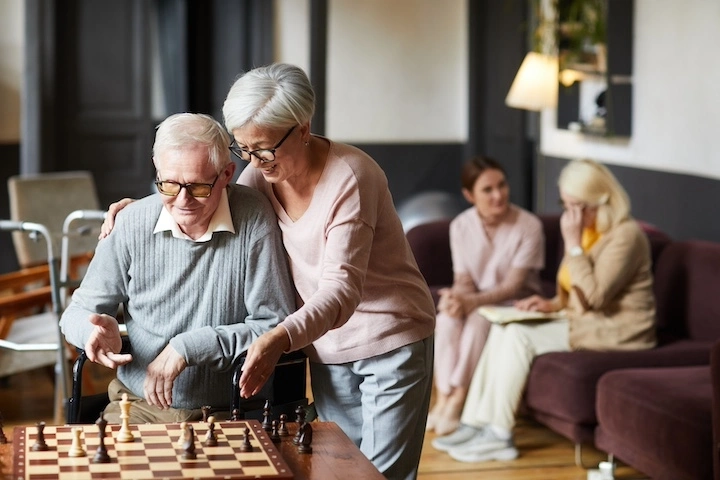
Risks associated with the use of essential oils for senior people
Warning against drug interactions and oral ingestion
Despite their many benefits, the use of essential oils is not without risks, mainly related to their misuse. “The oral route is not recommended for senior people due to possible interactions with some medications, or sometimes the weakness of certain functions (liver failure, kidney failure, etc.)” emphasizes Dr. Le Grand.
Although beneficial, essential oils are not without risks, especially for seniors on medication. Taking essential oils orally without medical advice can lead to serious drug interactions. It is therefore crucial to inquire and consult a healthcare professional before starting any use. Caution is also required when applying to the skin, requiring adequate dilution to avoid any irritation on skin that is often more fragile in older people.
Precautions for people with asthma or respiratory failure
Essential oils, due to their high concentration, can also irritate the respiratory tract. “This is the case in particular for essential oils rich in 1.8-cineole (= eucalyptol) such as essential oils of Eucalyptus globulus, Eucalyptus radiata, Ravintsara, Rosemary with cineole...” specifies Dr. Le Grand. People with asthma or respiratory failure should use them with great caution, favoring methods of use such as diluted skin application.
Tips for choosing your essential oils properly
For beginners, Dr. Le Grand advises starting with a small number of essential oils, ideally under the supervision of a healthcare professional trained in aromatherapy.
Selection criteria: organic quality, origin, and supplier
The quality of essential oils is paramount to guarantee their effectiveness and minimise risks. It is recommended to choose certified organic oils, guaranteeing the absence of pesticides and chemicals. The origin and traceability are also important, as is choosing a supplier known for its integrity and product quality.
Importance of allergy testing in the elbow crease
Before any skin use, allergy testing in the elbow crease is an essential step. This simple test consists of applying a small amount of diluted essential oil to the skin and observing the reaction within 24 to 48 hours. In case of redness, itching or other adverse reaction, it is advisable to refrain from using this essential oil.
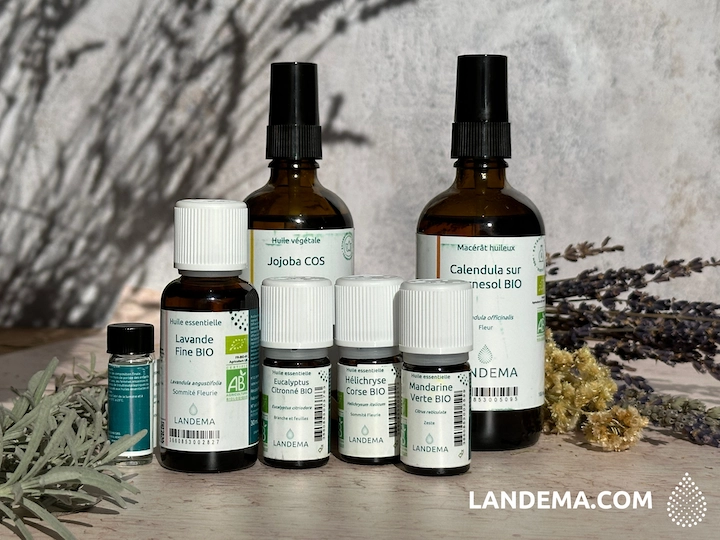
Selection of essential oils for seniors
Dr. Le Grand indicates: "For seniors, making a first aid kit with 5-6 essential oils is a good start and usually allows relieving the main age-related discomforts."
Here is her selection of recommended essential oils and her usage advice:
- Fine lavender (Lavandula angustifolia): “Soothing and healing, the essential oil of Fine Lavender is a staple of the first aid kit (preferably of French origin). Very well tolerated, even by the very young, it is one of the least toxic essential oils.
It can be used both topically for its antibacterial, healing and anti-inflammatory effects, and by inhalation for its effects on mood as well as its relaxing and sedative properties. I often advise my patients to breathe some Fine Lavender essential oil before undergoing a rather stressful medical examination.
My advice for burns or small wounds: 1 drop of essential oil diluted in a hazelnut-sized amount of Calendula macerate, massaged onto the affected area 3 to 4 times a day for 3 days.”
- Green mandarin (Citrus reticulata): “Soothing and calming for the nervous system, it helps regain sleep and facilitates falling asleep.
You can also use it in cooking to enhance a fish sauce or flavor a dessert to surprise your guests!
My advice for better sleep: Place 1 drop of Green Mandarin essential oil (alone or combined with 1 drop of Fine Lavender essential oil) on a tissue, breathe slowly and deeply every evening at bedtime.”
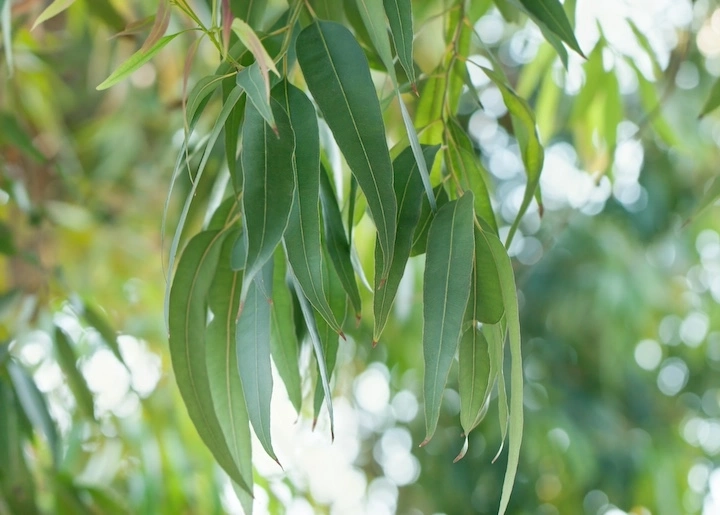
- Lemon eucalyptus (Eucalyptus citriodora): “Anti-inflammatory, this essential oil is often used to relieve physical pain. It is found in many massage balms for athletes. Be careful, however, to dilute it well in a vegetable oil as it can irritate the most sensitive skin. Its lemony scent (this essential oil is not to be confused with Eucalyptus globulus or Eucalyptus radiata essential oil) also helps drive away insects (mosquitoes, ticks...).
Some of my patients also successfully use it to discourage their cat from scratching the living room carpet or couch!
My advice for muscle or joint pain: 2 drops of Lemon Eucalyptus essential oil (added to 2 drops of Laurel essential oil) into the equivalent of one teaspoon (5ml) of St. John's Wort macerate, massaged onto the painful area morning and evening for 3-4 days. St. John's Wort macerate is photosensitising, so care should be taken not to expose the area of application to sunlight after use. If this is not possible, prefer dilution in a so-called "dry" vegetable oil such as Jojoba vegetable oil for example. »
- Noble laurel (Laurus nobilis): “This analgesic essential oil (thanks to the eugenol it contains) can be used for any kind of pain: muscle, dental... It is also an anti-infective essential oil. Be careful, however, because it can be allergenic (always test on the crook of your elbow before use).
My advice for toothache or canker sores: 1 drop of Laurel essential oil (possibly combined with 1 drop of Fine Lavender essential oil) in local application using a cotton swab, pure or diluted in an edible vegetable oil 1-2 times a day for 2-3 days.”
- Rosemary 1,8-cineole (Rosmarinus officinalis CT cineole): “In addition to its effects on the ENT sphere (respiratory anti-infective, mucolytic), it has been scientifically demonstrated that inhaling 1,8-cineole Rosemary essential oil improves short-term cognitive functions and memory. When presenting their research work, two British researchers suggested that 1,8-cineole Rosemary essential oil could be an avenue of research to combat memory disorders, especially in Alzheimer's disease. We would be wrong to deprive ourselves of this gift from nature!
My advice before a game of belote (or any other brain activity): 1 drop of 1,8-cineole Rosemary essential oil on a tissue, to be inhaled as needed.”
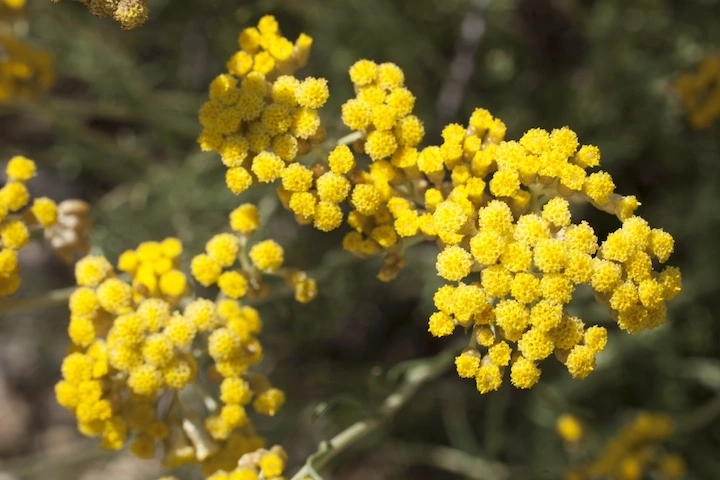
- Corsican Helichrysum (Helichrysum italicum): “How not to recommend this gem in the essential kit of must-haves... Also called Immortelle (because even when cut, its flower never fades) this small yellow flower produces a very small amount of essential oil (which explains its slightly high price). But do not panic, you will not need a large quantity to benefit from its remarkable anti-bruising and healing properties.
My advice for bruises, blows, bumps: one drop of essential oil diluted in 5 drops of vegetable oil, massaged onto the affected area 2-3 times a day. This essential oil will surprise you with its ability to limit the appearance of bruises and accelerate their disappearance!”
Application tips and usage precautions
How to properly dilute and apply essential oils safely
For topical use in seniors, essential oils should be diluted in vegetable oil (Sweet almond, Jojoba...) at 1-2% to minimise risks of irritation. This dilution allows safe application on the skin to benefit from the properties of essential oils without adverse effects.
Focus on dilution in vegetable oil for skin applications
Using vegetable oil as a carrier has the advantage of nourishing the skin while facilitating the absorption of the active ingredients of essential oils. The choice of vegetable oil can also be tailored to the specific needs of seniors' skin, thus providing complete, personalised care.
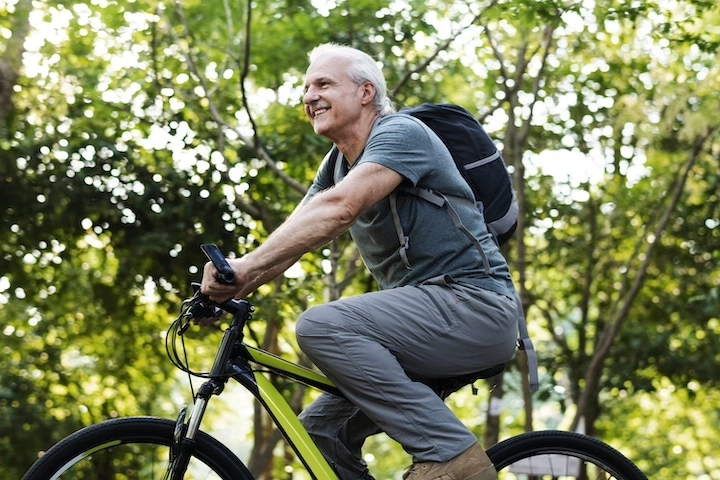
Essential oils recommended for spring season
With the arrival of sunny days, Dr. Le Grand suggests going out with a few bottles of essential oils: “You may feel like going for a walk, enjoying the fresh air and the first rays of sunshine. Consider including in your backpack (or pocket) the following 2-3 essential oils:
- Lemon eucalyptus (Eucalyptus citriodora): a few drops on shoes or pants legs will help keep ticks away, especially if walking through tall grass.
- Fine Lavender (Lavandula angustifolia): for blisters or small wounds, apply 1 drop locally to the affected area.
- Corsican Helichrysum (Helichrysum italicum): 1 pure drop on the area of impact in case of a fall.”
Essential oils, a valuable resource for elderly people
Essential oils represent a valuable resource for seniors, providing well-being and relief from many age-related discomforts. The enthusiasm for essential oils among seniors is part of a broader trend towards more natural, personalised care that meets the increased need for wellbeing.
Dr. Nelly Le Grand's expertise, which you can find on her website www.createurdesante.fr, offers invaluable perspective on the judicious and effective use of essential oils to improve seniors’ quality of life, underlining the importance of an informed, cautious approach.
Essential oils prove to be precious allies to meet seniors’ specific needs, marking a step towards a gentler, more integrated medicine that respects each individual’s uniqueness.
Choosing quality essential oils like those we offer at landema.com, patch testing before any use, and consulting a healthcare professional trained in aromatherapy are key steps to safely integrating essential oils into one’s daily routine.
Items that could
interest
Our essential oils
will simplify your life
FAQ
As a customer of the Landema website, did you know that we also have a physical store? If you live in the Landes, in New Aquitaine or are planning to stay there, do not hesitate to visit us! We are located in Le Sen, on the Biolandes site, very close to Labrit, Roquefort, and Mont-de-Marsan, in the heart of the Landes de Gascogne regional natural park.
Essential oils are natural aromatic substances extracted from plants. They are often used in aromatherapy for their health and wellness benefits. Essential oils can be extracted from different parts of plants, such as leaves, flowers, barks, roots or seeds. The use of essential oils dates back to ancient times, where they were used for their medicinal properties and to perfume cosmetics and skincare products.
Landema invites you to discover our product range composed of essential oils, absolutes, vegetable oils, macerates or hydrosols. Our catalog will grow over time, stay informed by subscribing to our newsletter.
We invite you to discover our practical guides and our blog where you can discover our advice and our cases of use of essential oils.
Your wishlist
You must be logged in to post a comment.
Login, or create an account
There is no comment for this article yet